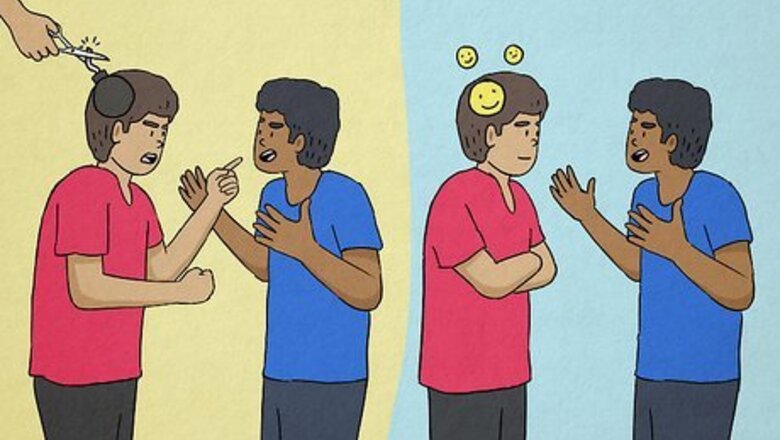
views
Staying Calm
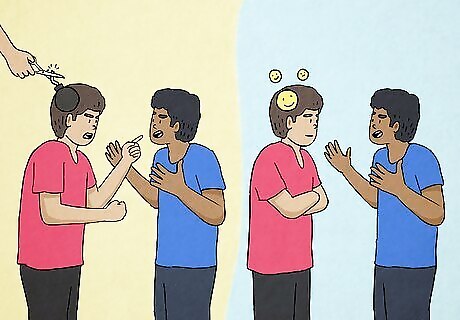
Control your emotions. Don’t let yourself blow up on the other person. The angrier you are, the harder it will be to walk away from the fight. Remember that you are in control. Try repeating a reassuring phrase in your head, like: “I’m going to be okay." "This isn’t worth getting upset over.” "Their opinion is not important."
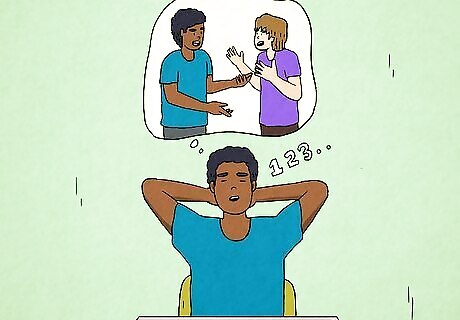
Take a moment before engaging the other person. Think about what you want to say. If you feel the urge to insult or attack them, take deep breaths from your diaphragm or slowly count to ten. The goal is to let your anger fade away so you can think rationally. Taking a moment to cool down will help you decide whether or not engaging them is really that important or necessary. You may decide that it's not worth it!
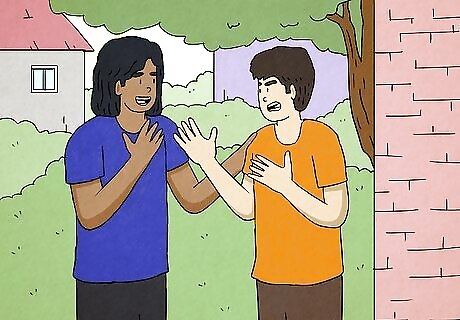
Empathize with the other person. Consider their point of view in the situation. Empathizing with them doesn’t mean you’re condoning their behavior, it’s just a way for you to get an idea of where they’re coming from. Once you understand their perspective, it will be easier let go of your anger and walk away from the fight. For example, if you’re fighting with a coworker who has an important deadline coming up, think about how the stress of their situation might be affecting their behavior. If your significant other is mad because you’re going out with friends, consider why they're angry instead of calling them irrational. They may feel abandoned.
De-Escalating the Situation
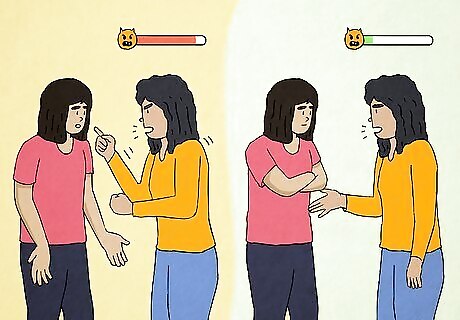
Assess the other person’s anger level. Look for visible signs of anger, like clenched fists, tense shoulders, and shaking. You want to know how angry they are so you can decide the best way to de-escalate the situation. If someone is visibly upset, they may lash out verbally or physically if you try to walk away. You may want to hear them out before you try to leave.
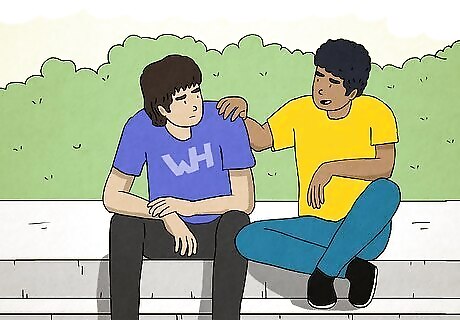
Tell the other person you care about them. Disarm them by sharing how you feel in a genuine way. Telling someone you love or care about them when you’re fighting can be hard, but it might help de-escalate the situation. For example, you could say “I love you and don’t want us to get angry at each other like this. Let’s not fight right now.”
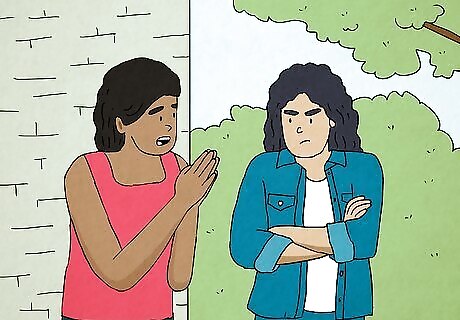
Apologize to the other person. You don’t have to mean it or believe they’re in the right. Set aside your pride and say you’re sorry so you can avoid a bad situation from getting any worse. Sometimes, an apology is all they need to hear. For example, you could say to a stranger you got in a fight with “I’m so sorry. That was my fault and I didn’t mean for this to turn into a fight.”

Ask the other person if you can both take a breather. Put the fight on pause so you can both have a moment to calm down. You’ll probably find that you’re both thinking more rationally when you come back together. For example, you could say to your friend that you’re fighting with “We’re not getting anywhere right now. Want to cool off and talk about this later?” If your friend is still persistent, explain that you want to resolve this flight, but you can't do it when you're not thinking clearly. This way, they won't feel attacked.

Make a light-hearted joke. Use humor to cut through the tension between you and the other person. They might be too angry to laugh, but a joke could stop the fight from escalating any further. Don’t use sarcasm or make a joke at the other person’s expense. This will make them feel that you're not taking their feelings seriously. If you’re fighting with a friend or your significant other, try an inside joke that you can both laugh about.
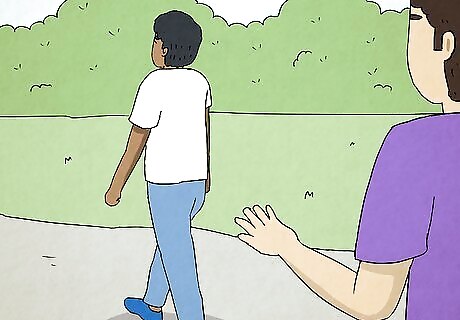
Walk away if the fight persists. Don’t allow the other person to use insults and personal attacks to rile you up. If someone is insistent on fighting with you, and you’ve tried to defuse the situation, you should leave. Walk away calmly, but with confidence. Confidence is key. If you appear insecure, the person may try instigating a fight with you. Keep your back straight, your shoulders pulled back, and your head high.
Walking Away
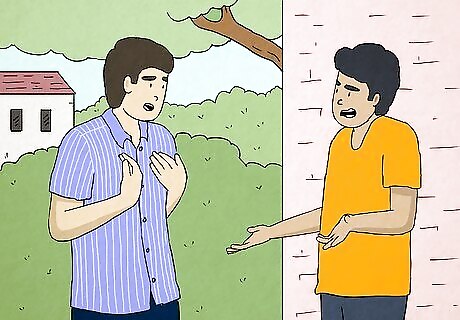
Tell the other person you’re going to walk away. Avoid storming out or walking away while they’re in the middle of saying something. You want to calmly exit the situation without further upsetting them. Calmly tell them that you’re not going to continue fighting. If you’re fighting with your significant other, you could say “I’m going to go for a walk,” or “I don’t want to fight right now. I’m going to go in the other room.” If you’re fighting with someone you don’t know, tell them “I have to go now, have a nice day,” and leave. If you’re fighting with a friend or coworker, be straightforward with them. Say “I’m going to go. Let’s talk about this later.”
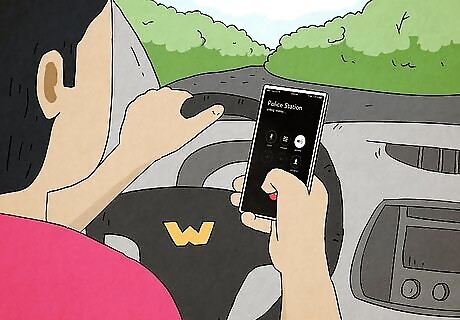
Go to a safe place. This could be another room if you’re at home, your office at work, or your car if you’re out in public. Separate yourself from the other person so you both have space to calm down. If the other person follows you, don’t engage with them. Respectfully tell them that you need time apart to think. If at anytime you feel like you’re in physical danger, call the police. Be careful if you're going to your car. Make sure that it's not in a secluded area and that you have a clear escape route. If possible, make sure that you are in a public area. This way, if the fight escalates, there may be others who can help you.
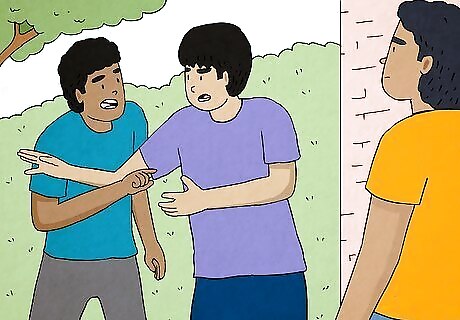
Get help if they’re being violent. Don’t engage with the other person and get physical unless you’re forced to defend yourself. Always try to walk away from the situation first. If you can’t and you’re in a public place, try to get the attention of someone nearby. If you’re at home and a fight turns violent, try to leave or lock yourself in a room. Call the police immediately. If you’re in a public place like a store or a park, look around for people who could help you. Attract their attention by being loud and calling out for help. If you’re at a bar or club and someone is trying to fight you, get the bartender’s attention or ask a friend to go find the security guard.

Reflect on the fight. Think about what caused the argument and everything that was said. Clear your mind and go over everything in your head. If you need to, write it down; this can help you figure out what went wrong and where. Learning from a fight can help prevent another one in the future. For example, if the fight was with your significant other, take the time to think about what underlying issues in your relationship caused the fight in the first place.















Comments
0 comment